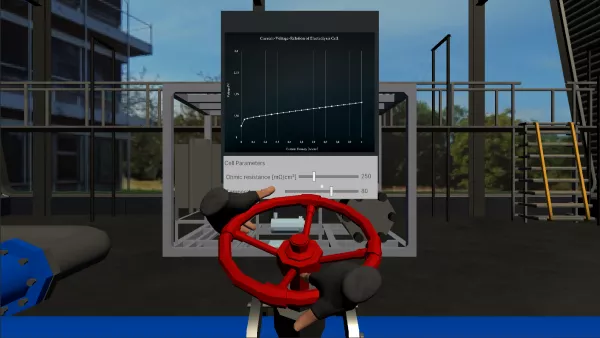
There are many different ways students can learn. One increasingly popular technique is the use of virtual reality (VR) - "learning by (virtually) doing!" At Ravensburg-Weingarten University of Applied Sciences (RWU), application-oriented research has been conducted in this area since August 2021. This is taking place within the framework of the SPEND project, funded by the Foundation for Innovation in University Teaching, in the Immersive Learning Lab of university didactics. The project aims to expand the digital transformation of classroom teaching at the university.
50,000 € for Tandem Fellowship
Now, the Immersive team, together with Professor Dr. Christoph Ziegler, head of the bachelor's program in Energy and Environmental Engineering, has received special funding of €50,000 from the Stifterverband and the Ministry of Science, Research and the Arts (MWK) to develop a virtual electrolysis lab. "With the Fellowship Program for Digital University Teaching, we are supporting universities in securing and further developing their digital teaching concepts," Baden-Württemberg's Minister of Science Petra Olschowski announced in a Jan. 23 press release. "The state government's goal is to prepare students for the demands of digital communication and collaboration in the working world and to enable them to actively participate in society," Olschowski added.
Bringing electrolysis plants to life
The funding from the Stifterverband and the MWK will now enable immersive learning. Students will be able to 'immerse' themselves in a virtual environment and experiment with electrolysis plants. The electrolysis of water - the decomposition into water and oxygen - is one of the key processes of the energy transition to store energy from solar and wind power in the form of hydrogen. Without seasonal energy storage, however, an energy system with a high proportion of renewable energies cannot be implemented. Students will learn to understand and apply the function of such plants in the virtual electrolysis laboratory. Not only electrolysis simulations can be performed. In the pioneering project of the Immersive Learning Lab, students can also learn how electrolysis plants are constructed and maintained.
VR important contribution to practical and future-oriented teaching
A comparable, real-world research environment for large-scale electrolysis plants cannot usually be realized at smaller, state-run universities for financial reasons. Realistic, practice-oriented teaching through the use of VR offers an attractive way out since within the VR environment the electrolysis process and its variants can be flexibly mapped and experienced. Adaptations to new process concepts are feasible in VR with little personnel and financial effort compared to the conversion of a technical center.
Through the project, RWU can make an important contribution to the education and training of specialists and engineers for the energy transition. The quality of teaching will also be promoted as a result. The project will run until November 30, 2023, and the virtual electrolysis lab will be integrated into regular teaching in the Energy and Environmental Engineering program starting in the winter semester of 2023/2024.
For technical questions about electrolysis, please feel free to contact Prof. Christoph Ziegler. For questions about other projects of the Immersive Learning Lab, please contact Markus Rossa.